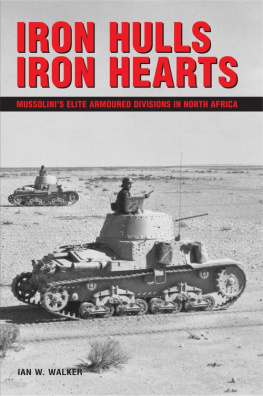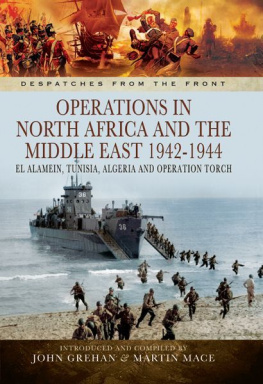This edition is published by PICKLE PARTNERS PUBLISHINGwww.picklepartnerspublishing.com
To join our mailing list for new titles or for issues with our books picklepublishing@gmail.com
Or on Facebook
Text originally published in 1991 under the same title.
Pickle Partners Publishing 2014, all rights reserved. No part of this publication may be reproduced, stored in a retrieval system or transmitted by any means, electrical, mechanical or otherwise without the written permission of the copyright holder.
Publishers Note
Although in most cases we have retained the Authors original spelling and grammar to authentically reproduce the work of the Author and the original intent of such material, some additional notes and clarifications have been added for the modern readers benefit.
We have also made every effort to include all maps and illustrations of the original edition the limitations of formatting do not allow of including larger maps, we will upload as many of these maps as possible.
THE NORTH AFRICA CAMPAIGN: A LOGISTICS ASSESSMENT
by
MARK D. KITCHEN, MAJ, USA
B.A.A.S., East Texas State University, Texarkana, Texas, 1983
ABSTRACT
This study analyzes the logistics operations of the North Africa Campaign. The thesis covers wholesale and retail level preparedness and execution of the U.S. ground force sustainment following the Allied landings in northwest Africa in November 1942. The analysis concludes with the German surrender in Tunisia in May 1943.
The logistical efforts of the campaign are studied against the framework of modern Airland Battle doctrine. The functional areas of manning, fueling, arming, fixing, and transporting are assessed by the doctrinal imperatives of anticipation, integration, continuity, responsiveness, and improvisation.
ACKNOWLEDGEMENTS
I would like to express my appreciation to Major George J. Mordica, Major David T. Weaver, and Colonel Floyd H. Duncan for their expert guidance and inexhaustable patience. I would like to thank my wife and children for the encouragement and confidence to continue. Lastly, I would like to convey my heartfelt gratitude to my sister, Kay Miller. Completion of this effort would have been impossible without her eager assistance.
CHAPTER ONEINTRODUCTION
In James Hustons definitive history of Army logistics, The Sinews of War , he wrote that War frequently is likened to a game of chess, but chess is no strategic game, for there is no logistics. {1} Strategic logistics dictated the when and where of Americas earliest combat involvement in World War IIOperation TORCH and the subsequent North Africa Campaign.
From this campaign emerged some of the most notable military leaders in the history of American modern warfare. Eisenhower, Patton, Bradley are names synonymous with the United States most important World War II successes. Much of the credit for these accomplishments must be attributed to the hard work and creativity of the militarys service and support branches. Logisticians faced the monumental task of supporting highly mechanical warfare against a formidable enemy. War would be fought in two hemispheres across vast oceans. In North Africa, Americans would encounter harsh terrain and climate coupled with a poor industrial and transportation infrastructure. The North Africa Campaign of 1942-1943 presented innumerable challenges to the U.S. logistics structure.
Logistically, the 1930s was a critical period for the American Army. This was an Army armed and trained on the heels of the Great Depression. Research and development of new and improved weapon systems and other military equipment before June 1940 was restricted because of lack of funds. From 1925-1940, the average annual expenditure in this area was only 2.5 million dollars, the preponderance of which was given to the Ordnance Department, limiting the Medical Department and Quartermaster Corps to less than $20,000 per year. In 1937, Congress appropriated only $2,000 for the development of clothing, equipment, and motor vehicles. {2}
The fall of Poland in 1939 and France in 1940 to the Germans, coupled with the potential of war with Japan forced planners to consider potential U.S. involvement. Two years was a short time to build a highly mobile fighting force. Our first campaignNorth Africawould be a demanding first test.
The primary research question for the following study is: How effective was the logistical support of the North Africa Campaign (8 November 1942-13 May 1943)? Further, was the United States Army prepared to logistically support desert combat following the invasion of North Africa in November 1942? How could logistical shortcomings have been prevented, eased, or eliminated? How does the support provided during the campaign stand up to the scrutiny of todays Airland Battle doctrine sustainment imperatives (by functional area)? What were the key sustainment lessons learned concerning support of intensive desert combat operations?
In order to pursue and answer the research questions, a general understanding of the strategic and tactical operations is required. What follows is a background summary which puts this study into its proper context and provides a framework for this logistics assessment.
THE BRITISH IN NORTH AFRICA
1939 saw the beginning of war in Europe. Adolph Hitlers Wehrmacht marched almost at will throughout the continent. Poland crumbled under the German onslaught in September of that year. By July of 1940, Norway, Belgium, Holland and France were occupied and under German domination.
Italy, though not a dominant military force in Europe, had aligned itself with Germany. The Italians had participated to a limited degree in the final moments of the fall of France. Not to be outdone by the Germans success, Mussolini directed Italian forces to attack British holdings in the Mediterranean, particularly in East Africa.
In September 1940, while the Battle of Britain raged in the skies of England, the Italians made their move. Using the diversion to their advantage, Italian forces stationed in Libya attacked a much smaller British force in Egypt. The attack bogged down with little success and the Italians reluctantly agreed to accept a German offer of help. Though Italy demonstrated little military prowess, they opened yet another front in October by invading Greece via Albania. Hitler had previously opposed this maneuver and temporarily withdrew his offer of support to the Libyan operation.
When both the Italians Libyan and Balkan campaigns began to falter, Hitler provided support to both. Security of the German southern flank was of critical importance to the German plan for the blitzkrieg of Russia in the summer of 1941. Hitlers military support also served to maintain the morale of the Italians and preserve the prestige of the Axis alliance. If Italy had fallen, the possibility existed that they could strike a separate peace accord with the British. Additionally, the free use of the Mediterranean by the British for future operations against the Axis powers could complicate or prevent a total German victory. {3}
To assist the Italian forces in east Africa, Hitler provided an armored force under the command of Generalleutnant Erwin Rommel. Rommels force, the German Afrika Korps, was an extension of Italian forces. Under the agreement, Hitler provided Rommel general directives only after Mussolini had approved them.







![Atkinson - An army at dawn: [the war in North Africa, 1942-1943]](/uploads/posts/book/178818/thumbs/atkinson-an-army-at-dawn-the-war-in-north.jpg)




